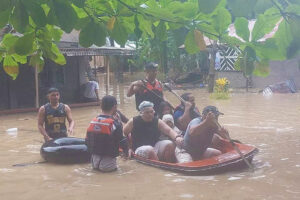
ADB finalizing $500-M PHL climate financing package
THE Asian Development Bank (ADB) is moving towards the approval of a $500-million loan to support Philippine efforts to mitigate climate-related disasters, the Department of Finance (DoF) said.
At a forum on Wednesday, ADB President Masatsugu Asakawa told Finance Secretary Ralph G. Recto processing the loan, which will be extended under the Climate Change Action Program (CCAP) Subprogram 2, is in its final stages, the DoF said in a statement.
The loan forms part of the bank’s $10-billion climate finance commitment for the Philippines through 2029, as announced by Mr. Asakawa during the United Nations Climate Change Conference in Dubai last year.
“The financing commitment aims to improve the climate resilience of communities, ecosystems, and the national economy. It focuses on investments in public transport, clean energy, disaster risk management, and social protection,” the DoF said.
CCAP Subprogram 2 aims to address poverty and reduce inequalities, accelerate progress promoting gender equality, build climate and disaster resilience, and enhance environmental sustainability. It also seeks to promote rural development and food security, and strengthen governance and institutional capacity, the ADB said on its website.
In 2022, the Philippines received $250 million under CCAP 1, the ADB’s first climate change policy-based loan program.
The bank will also continue leveraging regional facilities like the ASEAN Catalytic Green Finance Facility and the Green Climate Fund to enhance the Philippines’ access to grant financing, Mr. Asakawa said.
The ADB also held a first meeting on the ASEAN (Association of Southeast Asian Nations) Climate Finance Policy Platform, which will support Southeast Asian finance ministry leaders in pushing for collective climate action, he said.
The ADB Board is also set to review its new Country Partnership Strategy for the Philippines for 2024 to 2029 next week, according to Mr. Asakawa.
The framework will focus on critical areas like human development, economic competitiveness, quality infrastructure, climate action, and private sector development, the DoF said.
Mr. Asakawa also noted the bank’s support for the Philippines’ hosting of the Loss and Damage Fund Board, “emphasizing that this will further cement the country’s leadership on climate change issues in the region.”
President Ferdinand R. Marcos, Jr. on Wednesday signed Republic Act No. 12019 or the Loss and Damage Fund Board Act. The law grants juridical personality and legal capacity to the board, which oversees the international climate change fund.
The Philippines suffered around $10 billion in damage from climate hazards between 2010 to 2020, the DoF said. — Beatriz Marie D. Cruz



